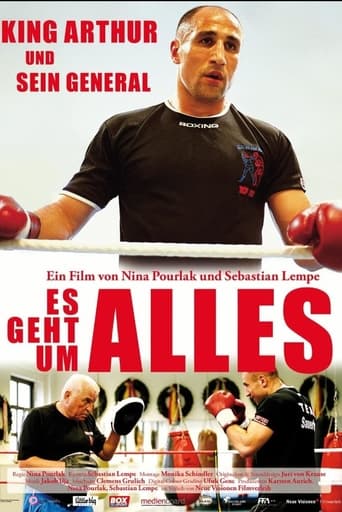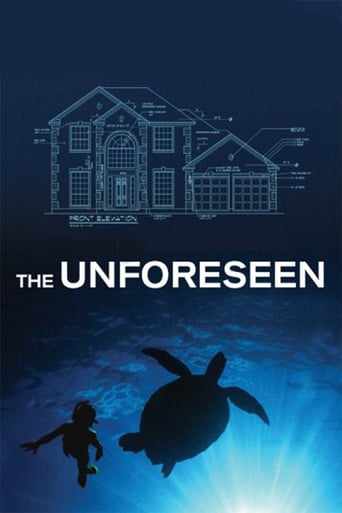


The Unforeseen
A documentary about the development around Barton Springs in Austin, Texas, and nature's unexpected response to being threatened by human interference.
-
- Cast:
- Wendell Berry , Robert Redford


Similar titles
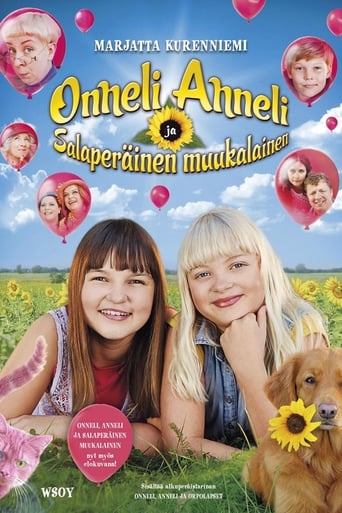

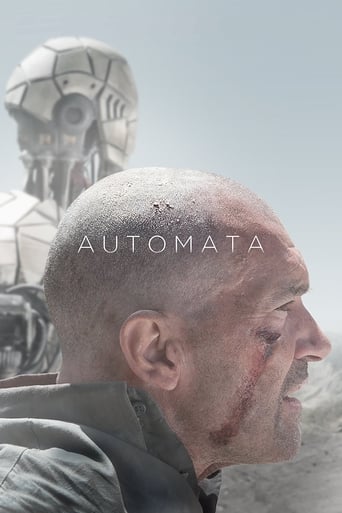
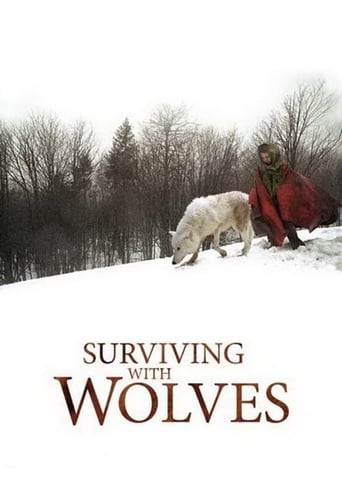
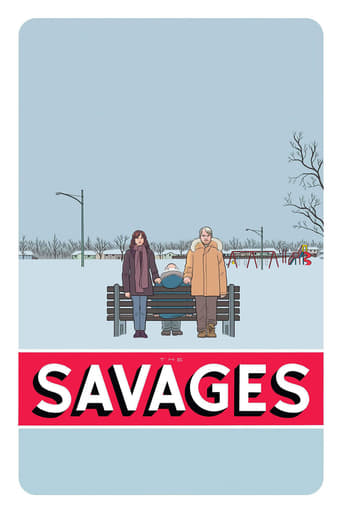
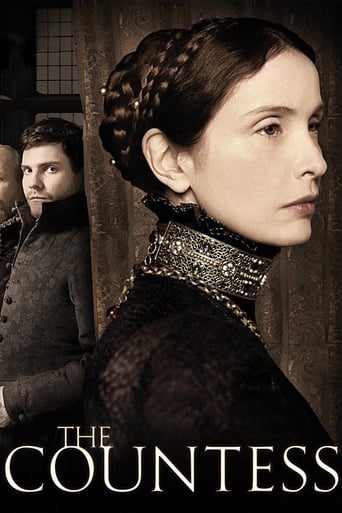

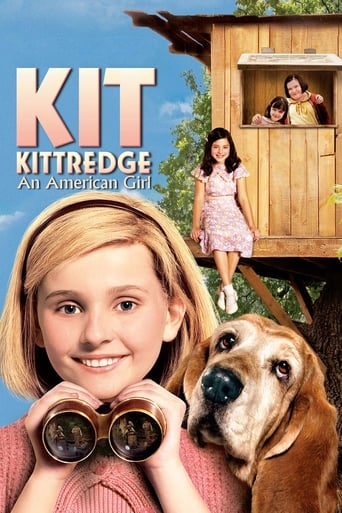
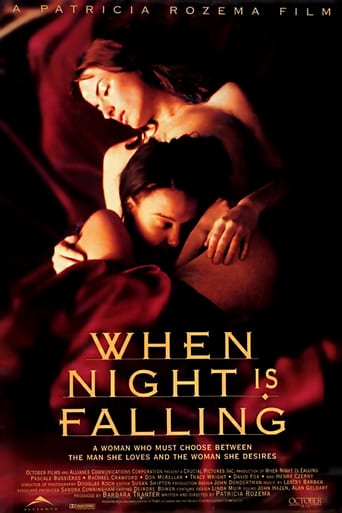
Reviews
Please don't spend money on this.
People are voting emotionally.
Far from Perfect, Far from Terrible
If you're interested in the topic at hand, you should just watch it and judge yourself because the reviews have gone very biased by people that didn't even watch it and just hate (or love) the creator. I liked it, it was well written, narrated, and directed and it was about a topic that interests me.
I coincidentally live in a section of Texas that is heavily wooded, mostly prominently with tall, old-growth Pine trees. In the 22 years I have lived here I shudder a bit each time I witness a plot of lend being clear-cut to make yet another "subdivision" or "business park", wondering about the mentality that drives the people behind these developments.This film, "The Unforeseen", helps answer that question, delving into the mind of Texas Developer Gary Bradley.Gary Bradley grew up far from the big city, in a rural farming community, but always knew he wanted to make something more of himself. He ended up at the University and later in Austin as a developer. He was the kind of developer who had the big plans, but by his own admission was lousy with the accounting. As a result he and his company went bankrupt and he ended up in jail. His story is folded into the broader story of how two segments of society can be at odds.The tragedy that ensued was the spoiling of Barton Creek, an almost religious location for many on the one side that wants to preserve nature. The other side are all those who relish the jobs and boost to their economy that "development" brings.The conservation group succeeded in convincing Texas that development of an area immediately upstream of Barton Creek would spoil the area, and one step in the process was to have then governor Ann Richards veto a bill that would have "grandfathered" zoning and construction regulations, which would have permitted development under old rules, even if modern technology shows that it would do undue harm. But when good old liberal, business partner George Bush got elected, the bill was re-introduced and this time Bush signed it, signaling the gradual death of Barton Creek. Ironcally the same Bush who initiated the unwise war in Iraq.What this movie goes to show is how one incompetent person (in this case George Bush) can undo and override the efforts of untold numbers of good-intentioned people.Robert Redford was a producer for this film, and he is shown in it. It is interesting that he said he learned to swim in Barton Creek when he was 6 years old.Good film, but hard to watch as it clearly shows the human stupidity at work.
Whether you support unfettered property rights on the one hand or a government's exercise of power to defend the common good on the other hand, this film will let you down. On the left, it's often unenlightening clap trap, especially when you notice the horribly sentimental background music. On the right, it points out the selfishness of those claiming to be the real Americans when they are mostly just "real loud" Americans. Someone should tell those folks that common sense says you don't shite where you eat, but as long as they're taking cash to the bank they'll apparently just do their business wherever they please. These people probably know that everything has consequences, but they plan for the other guy to bear those consequences, a guaranteed formula for social meltdown.The only admirable figures in the film were a wizened old farmer and a young boy in a new suburb. Those two seemed to possess a clarity of thought singularly missing from the property developers on one side and the ecological "Nimbys" on the other. It was nice, though, to see the late Texas governor Ann Richards again, certainly a far more lucid politician than the person who replaced her.I think neither side was well depicted in this film of the ongoing battle between personal vs. social, private vs. public. Ultimately, The Unforeseen is, unfortunately, a lightweight film on a very serious subject.
'The Unforeseen' considers the issue of land developers as a source of eco-disaster. These are the guys who come in, acquire chunks of property, subdivide them, establish access to services, water, electricity, roads, and so on, and build houses for people to live in. As a documentary this one, for which Robert Redford is an executive producer (with cultish filmmaker Terrence Malick) and also a meandering talking head, provides a worthwhile new angle, with some pungent characters and some interesting personal stories. Unfortunately this lacks some of the scope and perspective of other ecology-related documentaries and seems to get sidetracked more than once. It has a certain built-in balance since one of its main characters is a failed developer whose tears evoke sympathy. But in view of the magnitude of the issues involved, it would seem that those who herald 'The Unforeseen' as superior to a film of the scope and urgency of Davis Guggenheim's 'An Inconvenient Truth' have gone a bit overboard.Are developers bad? Environmentalists seem to think so. Some radicals even just set fire to a row of "green" McMansions under construction in the state of Washington. Frontier-oriented advocates of traditional free capitalism are emphatically in the opposite camp. To them, anything that enables people to exploit and own the land is good. Development is the essence of American free enterprise, a God-given right, what we're here for. Getting rich doing it is the essential American dream.. And so is owning your own little house with its garage and its lawn and its picket fence. Real estate people, and this film, give scant consideration to the issue of indigenous peoples and their relationship to the land.What this film does consider is how developers habitually disregard considerations of proper land use and future degradation, particularly of water resources. Laura Dunn's researches focus on Austin, Texas, a partial childhood home of Robert Redford (he tells us), a college town, a cultural and music center (Willie Nelson speaks for that) and a community whose obvious liberal, preservationist tendencies led its citizens to lock horns with developers in the 1980's, when growth opportunities arose for the appealing, pleasant city and its environs. At the center of the story is a developer named Gary Bradley, whose 4,000-acre Circle C Ranch luxury housing development--conceived as far back as 1980--was set to derail Barton Springs, a large creek near the city linked to the major aquifer of the region. An anti-Bradley Austin website called "Make Gary Pay" calls him "a consummate hustler" and documents how for close to thirty years he has waged war on the city of Austin in cooperation with lobbyists and Good Old Boys of the Texas state legislature.Central to the citizens' and environmentalists' objection to Bradley's project is its indifference to and damage to the regional aquifer. Wikipedia defines an aquifer as "an underground layer of water-bearing permeable rock or unconsolidated materials (gravel, sand, silt, or clay) from which groundwater can be usefully extracted using a water well." Describing residential land development early in the film, Bradley clearly sees big hunks of land simply as a blank canvas on which the creative real estate guy can draw a lovely new picture. He overlooks what's underneath that canvas--such as aquifers. Another factor the film reveals is that development exhausts energy sources and removes land from agricultural use.Bradley's voice, rather surprisingly, tends to dominate the film. We learn how he met with consolidated civic objections to his project when it came up for city approval. But later through the efforts of a lobbyist, whose voice we hear, his face sinisterly hidden as he methodically assembles a model bomber plane, a state law protecting projects like Bradley's--allowing them to override new laws and be subject only to ones in effect when they began (it's called "grandfathering") was vetoed in the early 1990's by the then governor Ann Richards, who had a sympathetic ear for environmental activists. But in 1995 George W. Bush became governor and the law was reinstated. And then around the same time Bradley came a cropper through debts he couldn't pay off and lost everything. He fell afoul of the late 1980's-early1990's loan company collapses. His attempt to file bankruptcy was finally defeated just a couple of years ago--right when his mother died, he tells the camera, tears streaming down his face. In fact, he's still a player and a thorn in the side of Austin.What's the lesson of all this? That real estate developers are foolish? Bradley admits in an audio of the bankruptcy trial that he was miserable at accounting. But not all developers are, though they may be prone to grandiosity--and an excessive sense of entitlement. As we see, they think they should be compensated when new laws lessen the profits they originally expected from a given piece of land. They don't all try to launch a major development right in the midst of a community as liberal and green-activist as Austin, Texas.Okay, if putting a self-serving and rapacious capitalist in charge of land development, though American as apple pie, is not a foresighted approach, what are the alternatives? Unfortunately Dunn's film doesn't provide strong enough voices in this area. We get to see concerted action of citizens both for and against development: the protectionists are impassioned; the free enterprise/property rights advocates are strident flag-wavers. But the voices for an alternative are feeble. Redford talks about how things were nicer in the past, quieter, more wholesome. 'Rolling Stone' essayist William Greider refers to the idea of reworking existing housing to accommodate new populations as a better way, but the idea's too vague. Nor does the Wendell Berry poem, "The Unforeseen" contribute more than a ringing tone of ruefulness. What we need is analysis, scope, and plans.
I saw this film previewed on PBS' NOW. It is just wonderful that someone has done a film about this issue. I love that the director took the time to learn about alternative views. This type of film making has the possibility of bringing people together to work on consensus.In an interview with the Austinist, Laura Dunn states:Unfortunately, the "American Dream" has become owning a house with a yard and a fence around it. And these days, unfortunately, that house has to be 2300 square feet, and you have to have a green lawn, and there are all these connotations and associations that are built into the American Dream that--given where we are in terms of our environment...are totally at odds with a sustainable future.We desperately need to have this film screened in Sacramento, California. The pressures we face from development are enormous. Does anyone know who I can contact about this?

